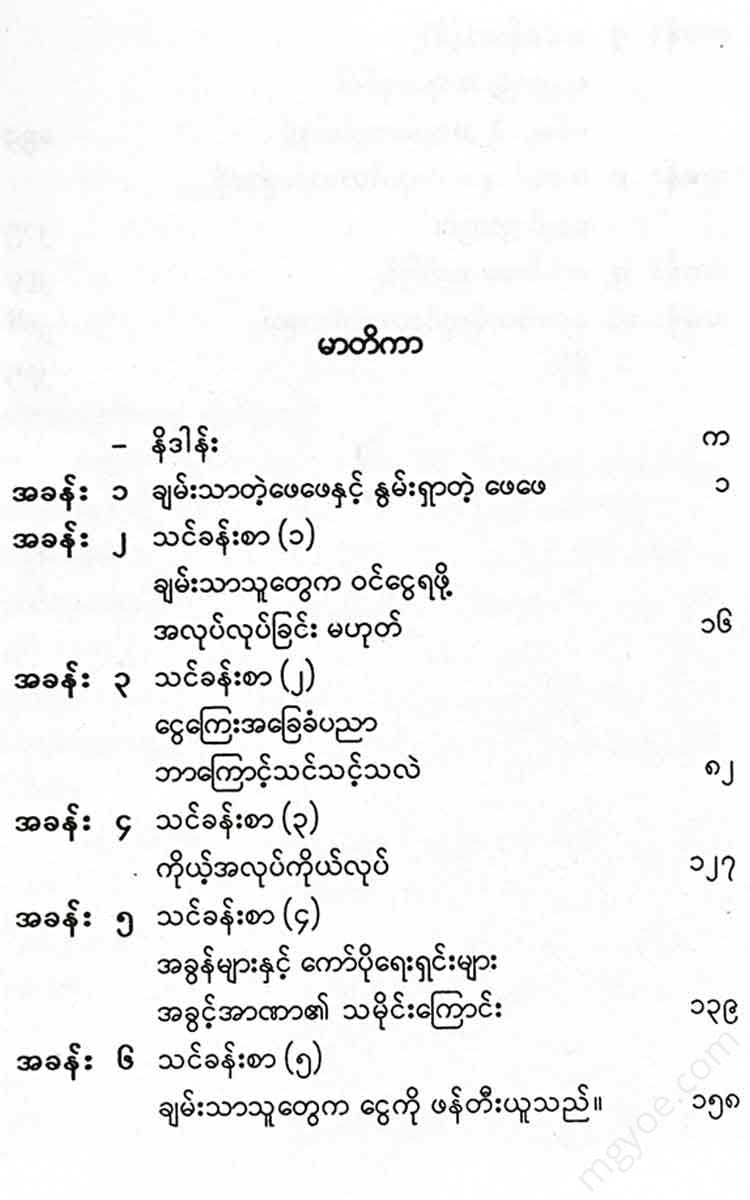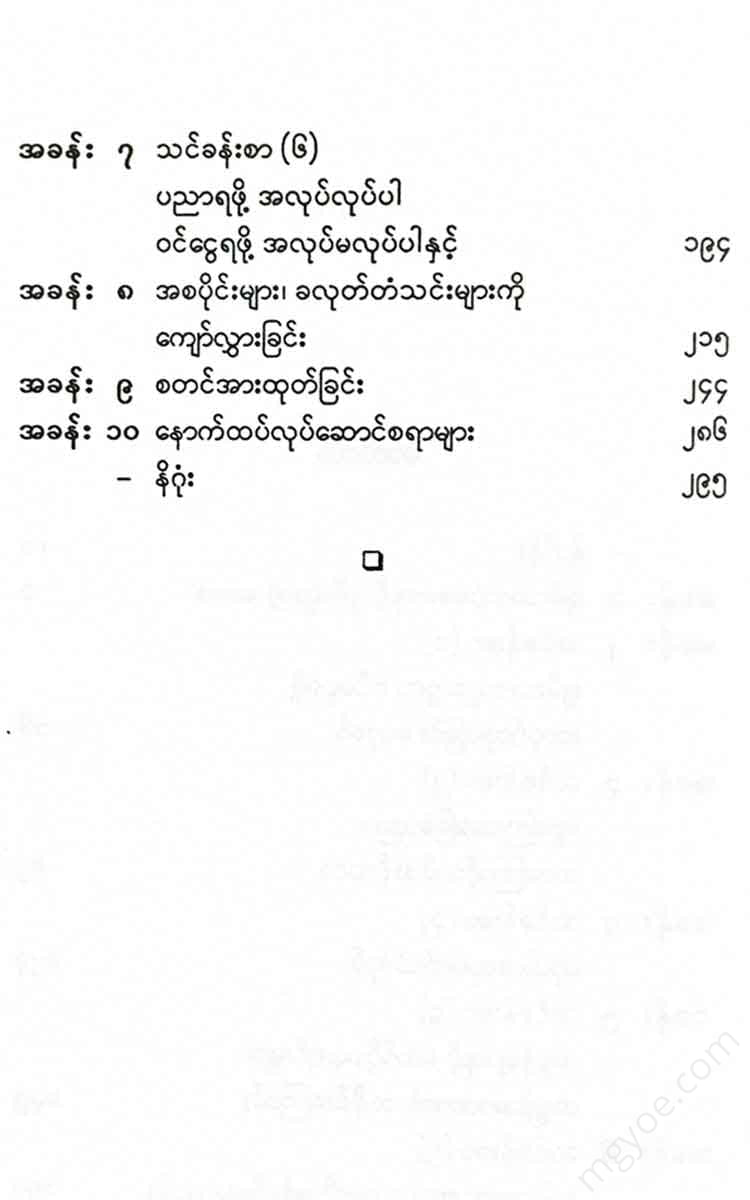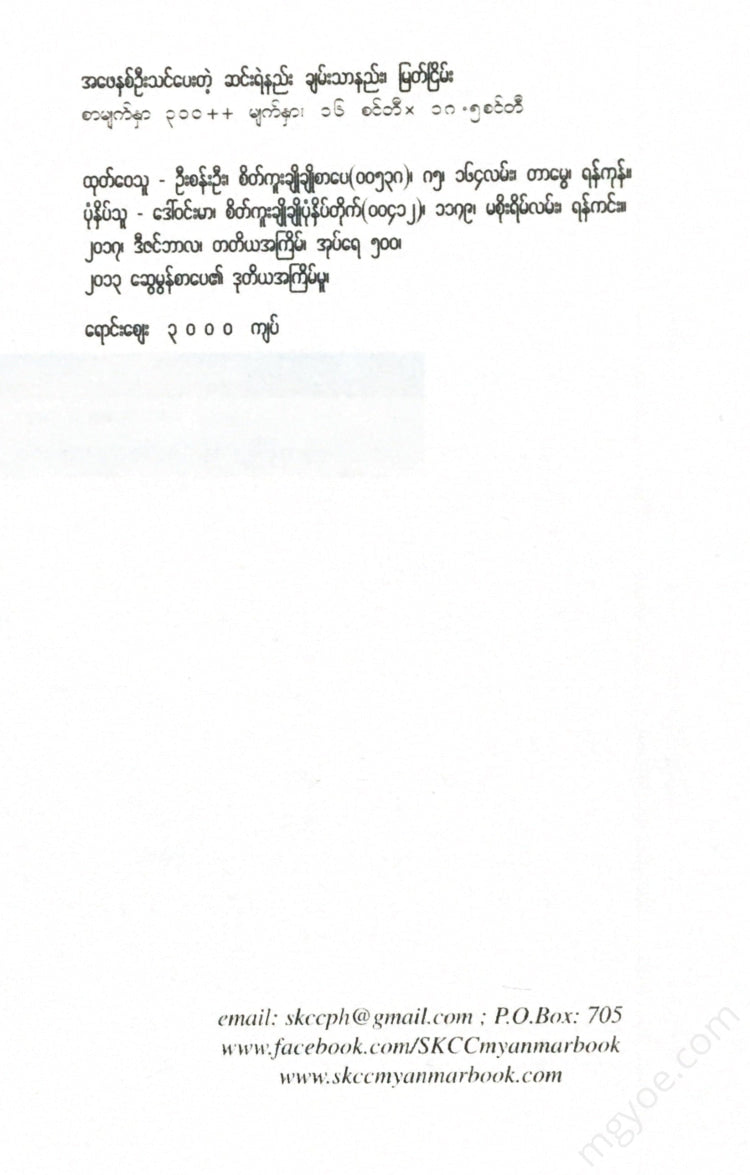စိတ်ကူးချိုချိုစာပေ
Myat Nyein - The way of poverty and prosperity taught by my two fathers
Myat Nyein - The way of poverty and prosperity taught by my two fathers
Couldn't load pickup availability
I have two fathers. One is rich, the other is poor. One is very educated and intelligent. He has a PhD. He dropped out of a four-year undergraduate program in less than two years. He then went on to pursue higher education at Stanford University, the University of Chicago, and Northwestern University. All four universities had scholarships to get him through. The other father didn't even finish eighth grade.
Both fathers worked hard all their lives. They were successful in their careers. They earned a decent income. Yet one of them struggled financially all his life. The other became one of the richest men in Hawaii. When they died, one left his family tens of millions of dollars. He left behind social and religious charities. The other left behind debts to pay off.
Both of my fathers were strong-willed. They had great influence. They both taught me. They disciplined me. But their teachings were different. They both believed strongly in education. However, the fields they advised and supported were different.
If I had only one father, I could either accept his advice or reject it. Now that I have two fathers to advise and guide me, I have the opportunity to compare and choose between different ideas and perspectives. The ideas of a rich man and the ideas of a poor man.
Normally, I would just accept the teachings of one and reject the teachings of the other. But instead of doing that, I compared their ideas. I weighed them. I thought more and more. And then I made my own choice.
The problem is that rich dad is not rich yet, and poor dad is not poor yet. They are both just starting out in their careers. Both are busy with money, family, and finances. However, their views on money are very different.
For example, one person says, “The love of money is the root of all evil,” while another says, “The lack of money is the root of all evil.”
Having two strong and influential fathers is quite difficult for a young man. I wanted to be a good son who obeyed my parents, but what they said was never the same. Especially when it came to money, their views were so different that I found it difficult to understand. I was curious. So I started to think about their individual ideas. It took me a long time to figure out what each of them meant.
I spend a lot of my free time thinking. I ask myself questions like, “Why did he say that?” Then I ask the same question of another father. It’s easy to just accept it and say, “Yes, he’s right. I accept what he says.” Or it’s easy to dismiss it and say, “This old man doesn’t know what he’s talking about.” But I have two fathers. I love both of them. That’s why I don’t think about it. That’s why I have to think about it. The habit of thinking about something before choosing something is more beneficial in the long run than just accepting it and rejecting it.
The rich are getting richer. The poor are getting poorer. The middle class is stuck in a cycle of debt. One of the reasons for this is that we don't learn about money in school, we learn about it at home. Most of us learn about money from our parents. So what do poor parents tell their children about money? "Go to school, work hard," they say. The child may graduate with honors. But the financial plan of a poor person and the mentality of a poor person will make them a graduate. The child has learned these things from a young age.
Schools don't teach money. Schools are all about academics and business skills. But they don't teach financial skills. This explains why bank managers, doctors, and accountants who have earned a lot of money in school and have become so successful that they spend their entire lives in financial trouble. Our great nation, America, is in an incredible debt. This is because the politicians and government officials who make financial decisions are very knowledgeable but have little or no understanding of finance.
I often look forward to the new century. I worry about the lives of millions of people who will need financial and medical assistance. They will become dependent on their families or the government for financial support. How can a country survive in the long term if it leaves the responsibility of teaching children about money to parents? Most of the parents who are entrusted with this responsibility are either poor or already poor, and the future of the country is uncertain.
I had two influential fathers, so I learned from both of them. I had to consider the advice and guidance of each of them. In doing so, I gained valuable insight into how a person's thoughts affect their life.
For example, one parent has a habit of saying, “I can't do it.” Another parent forbids them from using those words.
Instead, I encourage you to say, “How can I do it?” One is a statement. The other is a question. One gives you a free pass. The other forces you to think. My soon-to-be-rich dad explained it this way. By simply saying “I can’t,” your brain stops working. When you ask, “How can I do it?” your brain is telling you to do the work.
By that, he doesn't mean that you should buy everything you want, he's just a big fan of training your mind, the most powerful computer in the world.
“My brain is getting stronger every day. It's because I train it, and the stronger my brain is, the easier it is to make money,” he said. He believes that automatically saying, “I can't do it,” is a sign of boredom.
Both my fathers worked hard. But when it came to money, one of them put his brain to sleep, while the other exercised his brain. The long-term result was that one father became financially strong, while the other father became financially weak. Their situation was like that of a person who regularly goes to the gym and a person who sits on the couch and watches television. A person who exercises physically is more likely to improve his health, and a person who exercises mentally is more likely to increase his wealth. Laziness weakens both health and wealth.
My two fathers had opposing views. One said that the rich should pay more taxes to take care of the less fortunate. The other said, “Taxes punish those who produce and reward those who don’t.”
One father advised, “Work hard, so you can find a good company to work for,” while another urged, “Work hard, so you can find a good company to buy.”
One said, “I’m not rich because you have children,” while the other said, “I’m rich because you have children.”
One person encourages people to talk about money and business during dinner, while the other forbids them from talking about it during the meal.
“When it comes to money, use the safe method, don't be reckless,” said one. Another said, “Seek knowledge so that you can be confident and use your courage.”
One person said, “Our house is our biggest investment and our most valuable fixed asset.” Another said, “My house is a debt. If your house is your biggest investment, you are doomed.”
Both fathers paid their debts on time. Yet one paid what was owed first and the other last.
One relies on a company or government to take care of you and your needs. He worries about pay raises, retirement plans, medical benefits, sick leave, and so on. “I worked hard for the government. So I deserve these benefits,” he often says.
Another father believes in complete financial self-reliance. He dislikes the “entitlement” mentality. He says it breeds weak-willed, financially strapped people. He strongly advocates for financial literacy.
One father taught me how to write a cover letter that would get me a good job. Another father taught me how to write solid business and financial plans. That way, I could get jobs.
Growing up under the guidance of two strong fathers, I was given the opportunity to see and understand that different ideas create different lives. I began to realize that people shape their lives through their ideas.
For example, my poor father always said, “I will never be rich.” This prediction came true. On the other hand, my rich father always said that he was rich. He said things like, “I am rich, and rich people never do this.” Even when he lost a lot of money, he still called himself rich. “There is no difference between poverty and poverty. Poverty is permanent, and poverty is temporary,” he said to himself.
Poor dads often say, “I’m not interested in money” or “Money is not the point.” Rich dads say, “Money is power.”
We may not be able to measure the power of our thoughts. Or we may not be able to recognize them. But as a young man, I learned that I should be mindful of my thoughts. I learned how to express them. The poor father is poor. This is not because he has little income.









